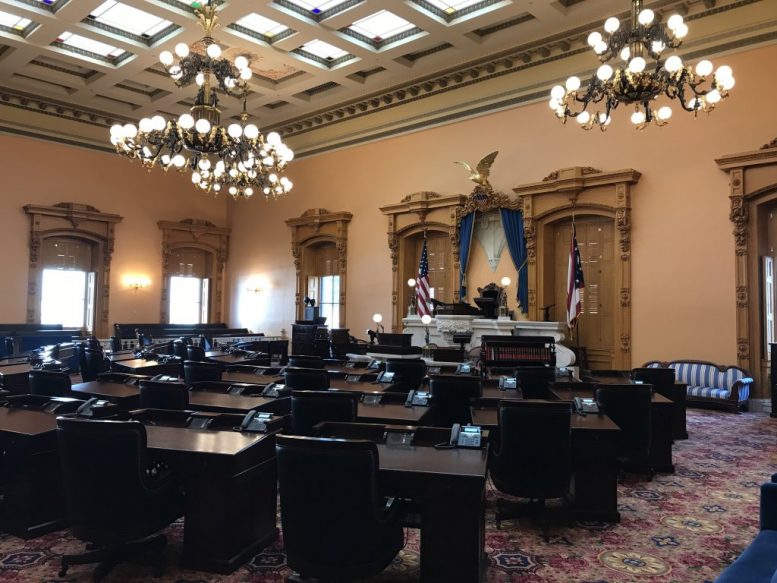Send this back and do better.’ Advocates criticize Ohio Senate’s version of state budget
Angry. Frustrated. Disappointed. Disturbed.
Those were the words various advocates used to describe the Ohio Senate’s version of the budget, which was released last week.
“When I first saw a draft of this, it was so bad I thought it was a mistake,” Michael Corey, executive director of the Human Service Chamber of Franklin County said during a press conference Monday morning at the Ohio Statehouse. “This benefits nobody. This hurts millions. This doesn’t make any sense. Send this back and do better.”
Gov. Mike DeWine must sign the two-year state budget by June 30.
“There are clear winners and losers that we see before us in the Senate budget,” said Kelsey Bergfeld, director of Advocates for Ohio’s Future. “Unfortunately, those winners are not the people of Ohio. It’s not families. It’s not focusing on those struggling to get to work and make ends meet.” READ MORE
Ohio Senate’s budget kills DeWine’s proposed affordable housing tax credit program
The Ohio Senate’s proposed budget axed a new affordable housing tax credit program first introduced by Ohio Gov. Mike DeWine in his budget.
The program would entice developers to construct low-incoming housing by making state tax credits accessible to projects receiving federal aid, but the Senate killed it.
DeWine originally capped the amount of credits to $100 million, and the House boosted it to $500 million.
Instead, the Senate proposed to expand a law that prohibits Low-Income Housing Tax Credit properties from getting a historic rehabilitation tax credit to any other federally subsidized residential rental property.
“We were in no way, shape ,or form ready for the all out assault that the Senate took on rental housing,” said Coalition on Homelessness and Housing in Ohio (COHHIO) Executive Director Amy Riegel. “The state housing tax credits was going to be a tool that would have greatly enhanced the number of affordable housing units being built across the state.” READ MORE
Local boards of election stressed by lack of funding in state budget for August special election
Local boards of election in Ohio are stressed following the announcement of the Senate budget, which underfunds the special election that the lawmakers created and that the boards spoke out against. Some lawmakers argue this is being done purposely to suppress voters.
Counties are attempting to get ready for the Aug. 8 special election.
“If you want election integrity and you want solid elections that you can believe in – that costs money,” said Tony Perlatti, director of the Cuyahoga County Board of Elections.
Perlatti has requested $3 million to be able to put it on in Cuyahoga County. Typically, special elections cost the state $20 million.
But when the Senate announced its first draft budget, State. Sen. Kent Smith (D-Euclid) noticed a problem with it.
“What was supposed to be a $20 million election was only funded at $15 million,” Smith said. “I thought, well, this is just the next way they’re doing voter suppression.” READ MORE
Ohio Senate restores some college student grant funding in proposed operating budget
The Senate’s version of Ohio’s two-year operating budget restores some of the funding Gov. Mike DeWine originally proposed to a grant program that helps college students who have the highest level of financial need.
DeWine introduced his proposed budget earlier this year and the Ohio House introduced their version of the budget in April. The Ohio Senate introduced their version of the budget Tuesday and they are expected to vote on it next week. The budget must be signed by June 30.
The Ohio Department of Higher Education, which serves more than 635,000 students, has a proposed budget of $3 billion for fiscal year 2024 and $2.9 billion for fiscal year 2025.
Ohio College Opportunity Grant
The Senate’s version of the budget gives more money to the Ohio College Opportunity Grant (OCOG) than the House’s version, but still less money than DeWine put in his original proposed budget. OCOG gives grant money to Ohio residents who have the highest level of financial need, as determined by the Free Application for Federal Student Aid (FAFSA).
The Ohio Senate’s budget appropriates $200 million for both fiscal years.
By comparison, DeWine’s executive proposal appropriated $216.2 million in fiscal year 2024 and $346.1 million in fiscal year 2025 for OCOG. The Ohio House’s budget decreased the appropriations to $140.0 million in fiscal year 2024 and $175.0 million in fiscal year 2025.
President of Inter-University Council Laura Lanese asked the Senate to restore OCOG funding during budget testimony in front of the Senate Workforce and Higher Education Committee back in May. READ MORE

